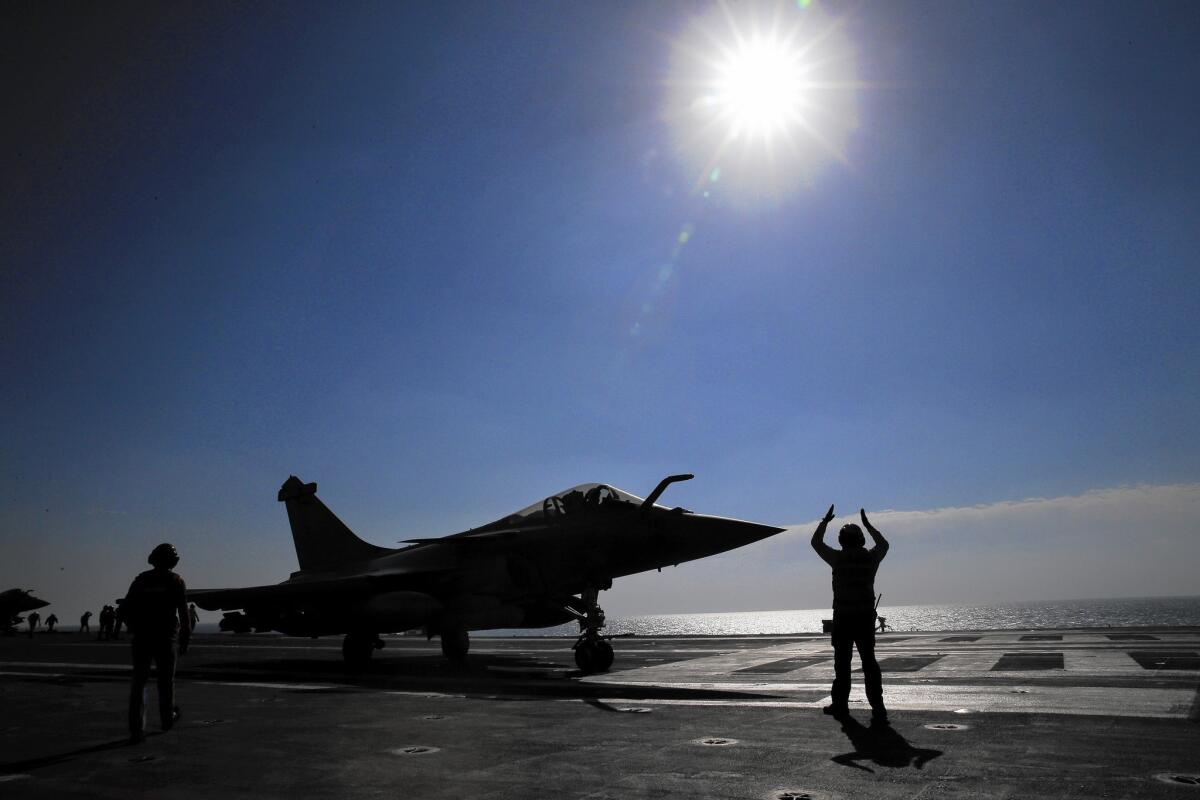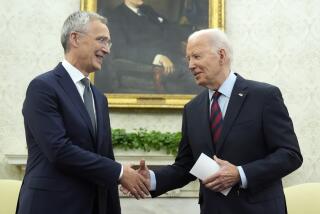U.S. to urge partners to do more to fight Islamic State amid complaints from Pentagon

Reporting from Washington — President Obama has repeatedly touted the U.S.-led coalition assembled to battle Islamic State militants, but Pentagon officials are expressing growing frustration that some of the 64 partner nations and regional groups are backing the effort in name only.
Secretary of Defense Ashton Carter has been the most vocal, complaining last month that some allies are “not doing enough or doing nothing at all.”
The grumbling comes as the White House considers stepping up the war effort by sending several hundred more U.S. and allied trainers, advisors and special operations teams to assist Iraqi, Kurdish and Syrian opposition fighters arrayed against the militants in Iraq and Syria.
Pentagon planners argue that more coalition troops and other help are needed before Iraqi security forces can recapture Mosul, the militants’ self-declared capital in Iraq. Last year’s battle to retake Ramadi, a much smaller city west of Baghdad, took months longer than U.S. officials had expected.
Meeting with his national security advisors Thursday, Obama was briefed on plans to accelerate military and diplomatic efforts “on all possible fronts,” the White House said.
Secretary of State John F. Kerry will go to Rome on Tuesday to seek greater support from two dozen nations in the coalition.
They will “discuss ways to further intensify commitments across all lines of effort to degrade and defeat this terrorist group,” the State Department spokesman John Kirby said Friday.
Carter will head to Brussels two weeks later to urge defense ministers from 26 countries to send more trainers and advisors, provide more support and reconnaissance aircraft, boost deliveries of arms and ammunition, and increase their role in the war, Pentagon officials said.
At least one nation has received the message. On Friday, the government in the Netherlands said Dutch airstrikes would begin to target militants in eastern Syria as well as in Iraq.
In a statement, Carter called the Dutch decision “a strong example” of what other countries should do. “Additional capabilities are needed from every member nation,” he said.
In addition to the military effort, coalition countries are supposed to impede the recruitment and travel of foreign fighters, stop the group’s funding and financing, address the humanitarian crisis and counter the group’s propaganda.
So far, the participation by each country has varied immensely.
Eight nations have launched bombing runs in Iraq, for example, and nine — mostly the same countries — have done so in Syria.
But America shoulders the heaviest load by far. U.S. warplanes have conducted 68% of the 6,655 airstrikes in Iraq and 94% of the 3,305 airstrikes in Syria since August 2014.
Join the conversation on Facebook >>
Coalition member Estonia, in contrast, has provided 12 mortars, 480 rifles and pistols, and more than a million rounds of ammunition.
“We’re a small country, so we can’t be all over the place,” Estonian diplomat Kairi Saar-Isop said. “We have to be very selective in how we help.”
Slovenia says it’s listed as a member of the coalition because it holds local courses designed to dissuade young people from becoming radicalized.
Lithuania has joined efforts to counter Islamic State propaganda and has helped track fighters trying to enter Europe, said Rolandas Krisciunas, its ambassador in Washington.
“We are currently in discussions to send instructors to Iraq to help them build the capacity of local police officers to be able to fight ISIS,” Krisciunas said, using another name for Islamic State.
Luxembourg has contributed $87 million to assist Syrian refugees and is adopting new financial regulations to help track money moving to the militants.
“We can’t do everything,” said Jean-Louis Wolzfeld, Luxembourg’s ambassador. “We prefer to give contributions in sectors where we have competency rather than send a few soldiers.”
Montenegro has sent ammunition to the Iraqi army and has passed laws to prosecute citizens who go to Syria to fight with Islamic State, said Srdjan Darmanovic, Montenegro’s ambassador.
“That’s what a country with 650,000 people can do,” Darmanovic said. “We try to contribute in accordance to our size and capabilities.”
The U.S. has sent 3,700 troops to Iraq. Sixteen other coalition countries have sent 2,400 troops.
Italian military police are training Iraqi police officers to secure cities once they have been retaken from Islamic State.
In northern Iraq, German, British and Dutch military advisor teams are training Kurdish fighters and providing new weapons, including antitank missiles.
Many of the other coalition members have beefed up security measures to identify and stop foreign fighters, and have donated money to humanitarian groups working with Syrian refugees. The U.S. remains the largest donor by far, however, giving $4.5 billion in aid to the Syria crisis.
In public, at least, Obama praises the joint effort. On Jan. 13, a day after he delivered his State of the Union speech, Obama noted that America has led a coalition of “more than 60 countries” for more than a year in trying to uproot Islamic State.
“We’re cutting off their financing,” he told a cheering crowd in Omaha. “We’re disrupting their plots. We’re stopping the flow of terrorist fighters. We’re stamping out their ideology. We’ve had 10,000 airstrikes. We’re taking out their leadership, their oil, their training camps, their weapons.”
The White House heralded support from its Sunni Arab allies when the air war began in September 2014, noting that aircraft from Saudi Arabia, Bahrain, Jordan and the United Arab Emirates all joined the early attacks in Syria. But those flights quickly ended.
Saudi Arabia launched its own war last year against what it says are Iranian-backed insurgents in neighboring Yemen. Other Sunni nations appear more focused on Shiite Iran’s growing clout than the threat from Islamic State.
Arab states disagree over whether to target Islamic State or the Syrian forces loyal to President Bashar Assad, who is backed by Russia and Iran, Yousef Otaiba, the UAE ambassador to the U.S., said Friday at the Center for Strategic and International Studies, a nonpartisan think tank in Washington.
“I think the first order of business if we are to resolve Syria is to get everyone on the same page and so far that has been very elusive,” Otaiba said.
The competing objectives have weakened the coalition, said Daniel Benjamin, a former State Department counter-terrorism coordinator who now teaches at Dartmouth College.
“You have the makings of a real disconnect between us and our partners,” Benjamin said. “Like other White Houses before it, this White House wanted to demonstrate the legitimacy of what it was doing in the region by pointing to a large coalition, but much of that coalition is focused on other problems and as a result we are doing all the work in the conflict.”
Times staff writer Tracy Wilkinson contributed to this report.
ALSO
In China, rise of Salafism fosters suspicion and division among Muslims
Bombs kill more than 50 people in Syria; progress is elusive at Geneva peace talks
Europeans remove welcome mat for migrants
More to Read
Sign up for Essential California
The most important California stories and recommendations in your inbox every morning.
You may occasionally receive promotional content from the Los Angeles Times.












